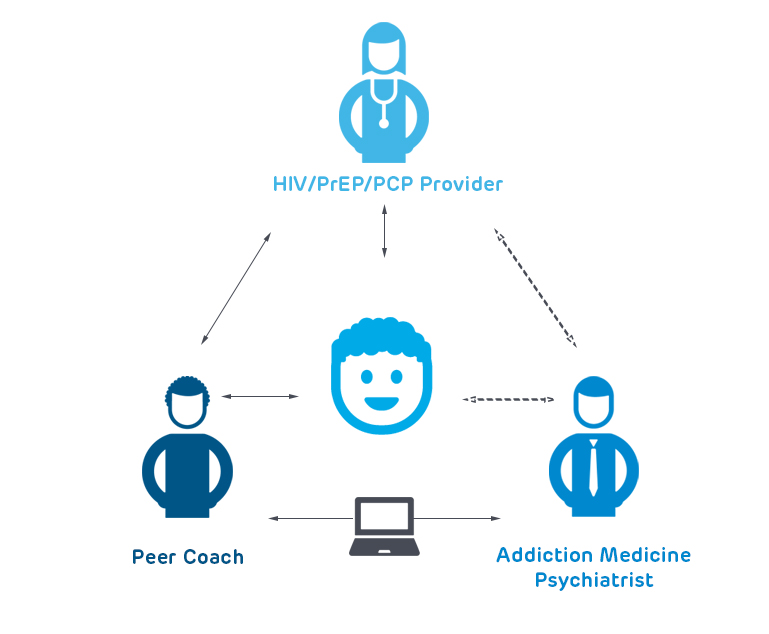CC PrTNER: Improving Engagement in Substance Use Treatment Among Young Black and Latino Men At-risk for or Living With HIV
Statement of Problem
In the U.S., young Black and Latino men who have sex with men (YBLMSM) are disproportionately affected by HIV and may be more vulnerable to substance use compared to their older peers. Substance use significantly impacts the relationship between HIV risk, diagnosis, initiation, and sustained antiretroviral therapy treatment (ART) and pre-exposure prophylaxis (PrEP). Furthermore, high rates of substance use in YBLMSM have been identified as a key factor hindering engagement and adherence to HIV prevention and treatment care.
A key gap in HIV treatment adherence and prevention is an inability to consistently address co-occurring substance use that may mediate YBLMSM’s experience within the HIV care continuum.
Approaches to substance use disorder diagnosis and care that are integrated with HIV prevention and treatment services within primary care settings have shown promise in increasing access to substance use and HIV prevention and care services. A collaborative care model is an evidence-based integrated mental health care model used in primary care settings. This project leverages the collaborative care model to address substance use, co-occurring with mental health disorders that particularly impact YBLMSM, and simplifies and normalizes the identification and treatment within the context of HIV prevention/care service provision.
Description
CC PrTNER: Improving Engagement in Substance Use Treatment Among Young Black and Latino Men At-risk for or Living With HIV
CC PrTNER: Improving Engagement in Substance Use Treatment Among Young Black and Latino Men At-risk for or Living With HIV


Our team will evaluate the impact of the collaborative care model to address substance use co-occurring with mental health disorders that particularly impact young Black and Latino men who have sex with men.
The Collaborative Care Prevention, Treatment, Navigation, Engagement, Resource (CC PrTNER) Intervention is a based on existing collaborative care models and is modified to address the specific needs of YBLMSM at-risk for or living with HIV with co-existing SUD.
In partnership with Johns Hopkins University, this study occurs in two phases: (1) formative research and development of the CC PrTNER intervention and (2) a randomized control trial testing the efficacy of CC PrTNER to increase initiation of PrEP (for those at-risk for HIV), viral suppression (for those living with HIV), and engagement with substance use treatment among YBLMSM ages 15 to 24 who are at-risk for a substance use disorder.
Formative data collected via surveys and interviews with medical personnel (i.e., physicians, nurses, social workers, clinical leaders, etc.) providing HIV, mental health, and/or substance use prevention and/or treatment care to YBLMSM will guide the adaptation of existing collaborative care models.
Once the intervention is developed, we will evaluate the feasibility, acceptability, and efficacy of the CC PrTNER intervention in a randomized control trial in participating clinics and community health centers in Philadelphia and Baltimore. YBLMSM ages 15 to 24 at-risk for or living with HIV who screen positive for SUD will be enrolled in the trial. Participants will be randomized into the intervention or standard of care arm and followed for 12 months. Participants will complete a survey on sexual health, care and engagement, and labs at baseline and every 3 months.
Participants randomized into the intervention arm complete additional visits with a peer coach trained in motivational interviewing and supported by an addiction medicine psychiatrist. Intervention participants meet with their coach weekly in the first month to build rapport and create goals with the coach. After the initial one month, coaches work with an addiction medicine psychiatrist(s) to provide support to participants based on their coaching sessions and monthly behavioral surveys. The coach additionally works with the primary care provider to provide recommendations from the psychiatrist.
CC PrTNER will compare outcomes of the intervention and control arms, including the proportion of YBLMSM with co-existing substance use at risk for HIV who initiate (start or restart) PrEP over the 12 months and the proportion of YBLMSM with co-existing substance use living with HIV who are HIV virally suppressed at 12 months. This study will also evaluate the effect of the intervention versus standard of care on non-tobacco substance use in YBLMSM with co-existing substance use and examine the effect of change in substance use patterns on PrEP uptake and HIV viral suppression.
Next Steps
Our next steps include completing the formative phase and testing the CC PrTNER intervention to modify the model for clinical implementation across primary care and HIV care settings.
This study may provide key preliminary data for future development of collaborative care models that are culturally sensitive and appropriate for YBLMSM at risk for or living with HIV and a substance use disorder, as well as supporting clinic teams who provide substance use prevention and treatment care.
This project page was last updated in June 2024.
Suggested Citation
Children's Hospital of Philadelphia, PolicyLab. CC PrTNER: Improving Engagement in Substance Use Treatment Among Young Black and Latino Men At-risk for or Living With HIV [Online]. Available at: http://www.policylab.chop.edu [Accessed: plug in date accessed here].